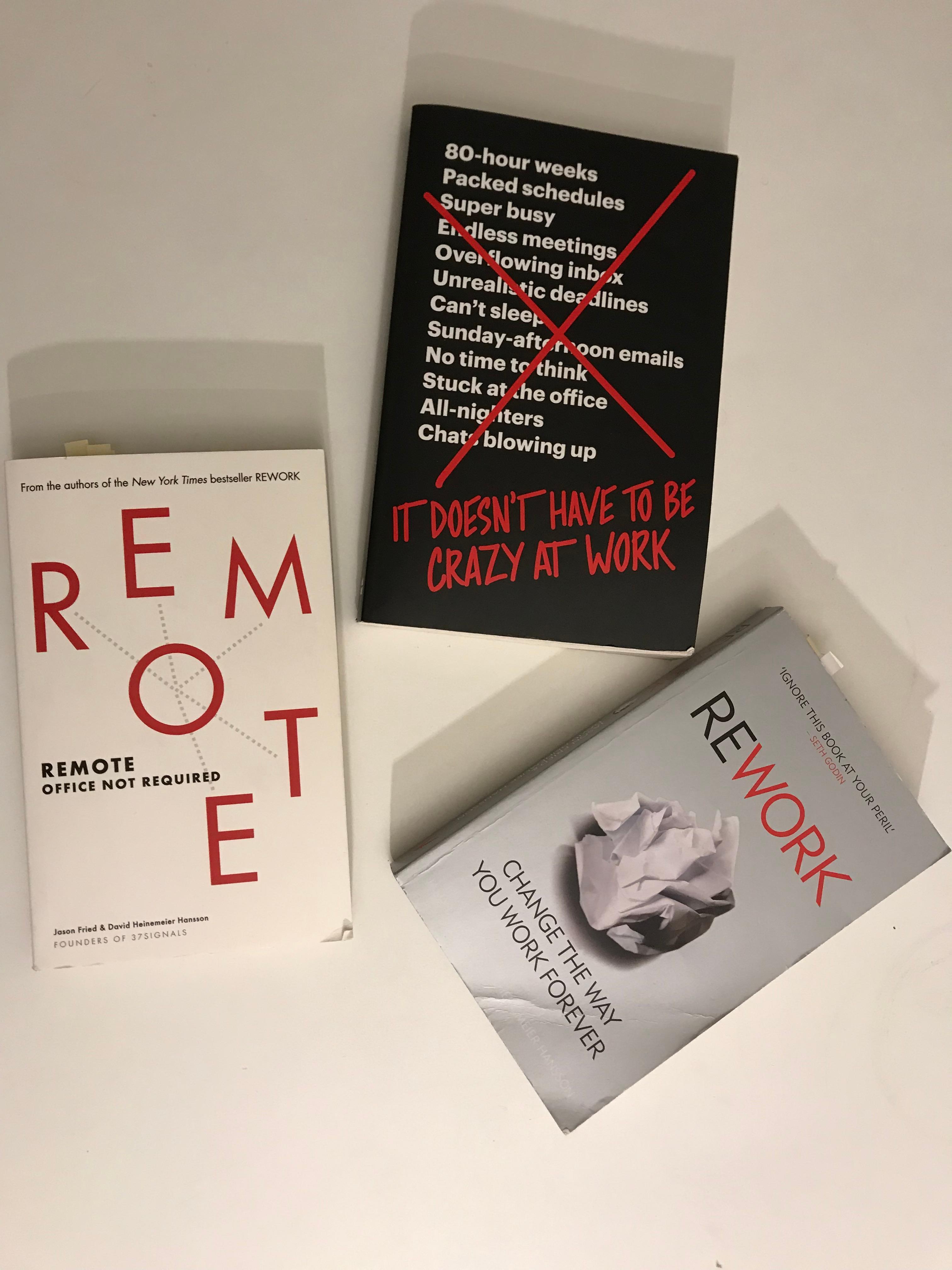When a company achieves success and its products are increasingly in demand on the market, the common tendency is to think that it should produce more, reach more customers, and therefore that its structure and teams should grow accordingly. But what if success could be based on "doing less but better" rather than "always more"? At Basecamp, an IT company that created a collaborative project management tool, they have chosen to remain "intentionally small" from the beginning.
"Remote," "Rework," and "It Doesn't Have to Be Crazy at Work," the books by Jason Fried and David Heinemeier Hansson, are like recipe books in which the two founders of Basecamp share the ingredients used to create their company in 2004.
One can discover how the 50 employees who make up the organization work together from all corners of the world today, and how they have chosen to communicate less to communicate better (You can read our article here).
There’s nothing wrong with being small. You can do big things with a small team. - Jason Fried
One also learns about a somewhat unique approach to growth for a software development company, born in the 2000s, in the land of unicorns...

On the first page of "Rework," one can read: "We're an intentionally small company that makes software to help small companies and groups get things done the easy way."
So, Basecamp is a "small" company that wants to remain so. Why strive to grow too quickly? Or even grow at all? Have you ever noticed how young companies are eager to increase their workforce when large companies dream only of more agility and flexibility? The founders of Basecamp have their own approach to the question.
Small is not just a stepping-stone. Small is a great destination in itself - Rework, 2010
But what does "intentionally staying small" exactly mean? Here are the 4 principles that reflect their philosophy:
1 - « Hire when it hurts »
At Basecamp, recruiting is not taken lightly! Every recruitment must adhere to the principle of "hire when it hurts," meaning when it is felt that one is no longer able to manage their workload or that its quality no longer meets expectations, over a significant period. It must also be demonstrated that this additional workload cannot be resolved by a new tool or a simple optimization of task management (for example, by learning to say "no"!). Thus, teams being autonomous in recruitment, each person wishing to open a new position must convince their team members of the need to recruit. If the decision is made, they are responsible for writing and sharing an announcement and conducting interviews.
If you feel overworked for a sustained period or you feel like the quality of your work is sliding. That’s when it’s time to hire. […]. The pain should be persistent, something that cannot be resolved by using a new tool or saying no to extra work - Wailin Wong
This principle serves as a decision-making tool in recruitment and prevents falling into the trap of hiring "nice to have" profiles during a revenue growth period, but which unfortunately must be let go of first in case of financial difficulties, also leaving a bitter taste in the mouths of those who remain...
This principle also promotes a certain "work ecology," encouraging everyone to listen to themselves to detect the weak signals of an increasingly heavy workload without a significant increase in activity, and to regularly question themselves to avoid saying "yes" to everything.
The company thus grows at its own pace, with very targeted recruitments, low turnover, and a small, agile team over time.
2 - Rethinking growth linearly
While the exponential growth of some startups attracts more easily the spotlight, this does not make it the only path to success. At Basecamp, they promote "linear" growth, i.e., without artifice, unlike exponential growth. And with linear growth comes no fundraising.
Outside money is plan Z - Rework
In this spirit, the team does not hesitate to freeze hires or restrict the number of new clients to maintain an optimal size to focus on developing a high-value product for customers. They regularly communicate their viewpoint on the company blog: Signal v. Noise.
Linear growth is what happens in domains that aren’t animated by network effects (and when no artificial growth hormones are injected!). It’s the simplicity of good products sold at reasonable prices that find happy customers. These customers talk to friends and colleagues in other businesses, and over time that word of mouth spreads the good vibes, which turns the business up. - David Heinemeier Hansson
3 - Get to the point
Staying small is not always a walk in the park, you have to:
Follow the minimalist principle of "launch now" presented in "Rework": the essential thing is to deliver a product that brings immediate value to the customer and think about the rest later. For example, having only 10 months to launch a new version of their product Basecamp Next in 2012, they deliberately chose not to keep all the features of the classic version. If some customers were delighted with the new version, others, unhappy not to find their favorite/essential features, could choose to stay on Basecamp Classic. In this way, they were able to bring the value they considered most important to their users, while allowing those who found it elsewhere not to lose it.
Ask the right questions and do not get carried away with unnecessary or low-value-added actions. The "Launch now" principle implies that of value: if the goal is to deliver value to the customer, you need to know where it is and who benefits from it. Thus, Jason and David insist that one must constantly ask oneself:
- Why am I doing what I am doing?
- What problem am I solving?
-
Is it useful?
Thus, one does not stray from one's original goal and makes decisions consistent with our values and the needs of customers. This is what helped them prioritize the famous features in the initial development of Basecamp Next.
Cool wears off. Useful never does - Rework
4 - Learn to let go
When intentionally small and not aspiring to exponential growth, one must learn to let go to focus on the essentials. And Basecamp's teams have become pros at it, regarding their products, their customers, and even their revenues!
On the product side:
Created internally in 2008, Highrise is a CRM tool developed by Basecamp. When this activity becomes too important and the teams feel that they will not be able to give it all the attention that the development of this tool deserves, they choose to spin it off. In 2014, Highrise became a separate company with a CEO and a dedicated team of 7 people. It should be noted, however, that Highrise has been back with Basecamp since 2018: accepting to let go sometimes means accepting to let it come back better 😉
On the customer side:
Another motto at Basecamp: "Let your customer outgrow you." Some sources of revenue are intentionally not seized. The company deliberately lets go of certain products or even certain customers because a small team also means smaller customers: it's not easy to operate a service for thousands of users within a large structure when you are only fifty employees. And if Basecamp chose not to grow exponentially, that's not necessarily the case for its customers. So sometimes you have to accept that our product can no longer meet their needs and not insist on keeping a customer who wants to explore new horizons.
To go even further, the two founders regularly mention the importance for them of accepting the "impermanence" of a company, in the sense that it may no longer be relevant, disappear overnight, and that it is necessary not to become attached to it and not to insist, to abandon the notion of control, the desire for hyper-growth. This allows for a better approach to business and, above all, to spend more time doing what we enjoy in our work.
Regarding revenues:
37 Signals was a software development company with several products before becoming Basecamp. Each product was profitable. However, the team preferred to focus on a single product to respect its philosophy. Their goal is not to maximize short-term profit but to flourish by developing a quality product in the long term.
We’ve made it 17 years, but maybe we last for a total of 25 years. Maybe 40 years. Obviously, I want to continue to do this as long as we’re relevant and doing good work - but should the day arrive where we are no longer relevant and no longer doing work that people are interested in, then that’s okay too. - David Heinemeier Hansson
An entrepreneurial approach based on a minimalist philosophy
By delving into books, lectures, articles, or even podcasts on Basecamp's organization, one discovers that this form of minimalism shines through in all aspects of the company: its communication, work pace, product approach, etc. While this approach may not suit all companies, it remains a potential source of inspiration for those wondering about the evolution of their organization.




